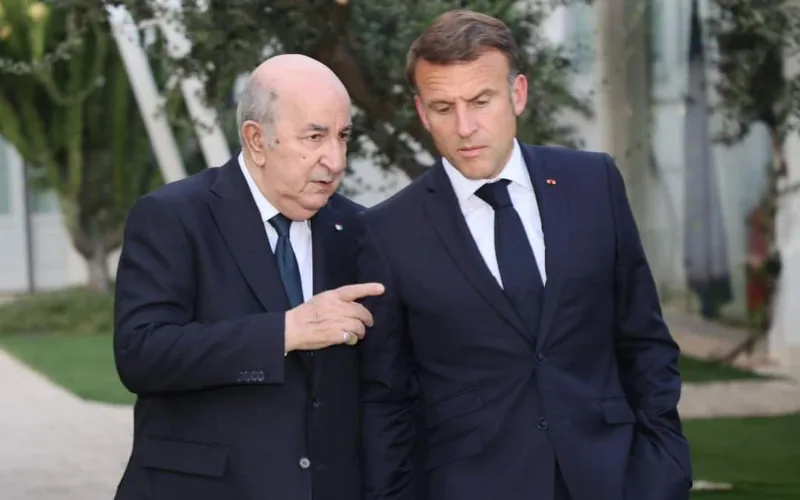France Backs Morocco’s Sahara Claim, Straining Ties with Algeria

France’s recognition of Morocco’s sovereignty over the Sahara has ended the long diplomatic crisis between the two countries and opened another major one between Paris and Algiers. A look back at the origins and political and economic stakes of these diplomatic tensions.
Paris and Rabat are experiencing perfect harmony since the normalization of their relations last October, following France’s recognition of Moroccan sovereignty over the Sahara and Emmanuel Macron’s visit to Morocco. Since then, the two countries have strengthened their economic cooperation. "We’ve gone from the worst crisis in twenty years to a real honeymoon," rejoices Hamza Hraoui, founder of MGH Conseil, to Challenges. France has even decided to share its experience in organizing sporting events with Morocco. On April 24 in Maâmora, the French Minister of Foreign Trade, Laurent Saint-Martin, announced the creation of a Franco-Moroccan task force for the next World Cup that Morocco is organizing jointly with Spain and Portugal.
Meanwhile, a crisis has arisen between France and Algeria, which has not digested Paris’s decision to support the Moroccan autonomy plan for the Sahara. Algerian authorities accuse the French DGSE of "destabilizing" their country. Tensions have escalated with the Boualem Sansal affair, the Franco-Algerian writer sentenced to five years in prison for criticizing the regime, and the arrest in France of an Algerian consular agent, leading to the expulsion by Algiers of 12 French diplomatic agents from its territory. Under the principle of reciprocity, France reacted by also expelling 12 Algerian diplomatic agents. "No emergency measure can now end this crisis," estimates a specialist in relations between the two countries.
Morocco finds itself unwittingly at the heart of this crisis between Algiers and Paris. Relations between the kingdom and France cooled after the Pegasus affair and the reduction in the number of visas for Moroccans, decided in 2021. President Macron, who since 2017 had been trying in vain to get closer to Algeria at the expense of Morocco, decides to end this long diplomatic crisis. He lays the groundwork. Christophe Lecourtier, appointed ambassador to Morocco in late 2022, will play a decisive role in the reconciliation process. As early as February 2024, the first signs of a warming of relations are revealed with the reception at the Elysée of King Mohammed VI’s sisters. A major act that paved the way for a series of official visits by French ministers to Morocco, starting with Stéphane Séjourné (Foreign Affairs), then Franck Riester (Foreign Trade), Bruno Le Maire (Economy) and Franco-Moroccan Rachida Dati (Culture).
Paris seized the opportunity of the Throne Day, on July 30, 2024, to reaffirm its support for Morocco on the Sahara issue. "France considers that the present and future of Western Sahara fall within the framework of Moroccan sovereignty," Emmanuel Macron wrote in a letter addressed to Mohammed VI. The choice is definitively clear. Paris prefers to strengthen its ties with Rabat at the expense of Algeria. "We were losing Morocco and we had to get out of this cycle of crises, independently of Algeria. However, Western Sahara is the prism through which Moroccans view their environment," explains a diplomat. "To regain a foothold in Africa, France needed its Moroccan ally," adds Abdelkader Abderrahmane, researcher at the Institute for Security Studies in Dakar.
As expected, Algeria condemned the French recognition of Moroccan sovereignty over the Sahara, denouncing an "unexpected, inopportune and counterproductive" decision. "This situation is fundamentally different from past crises. France is no longer a partner with whom we have differences on memorial, migratory or economic issues. It has joined the club of enemies like Morocco, the Emirates or Israel," notes a former Algerian diplomat. And a current Algerian diplomat adds: "France has embedded itself in the middle of the firing range between Rabat and Algiers." However, "Algiers keeps the door open and awaits a strong gesture," emphasizes an Algerian official. "With Algeria, we are obliged to find the path of dialogue," indicates the Quai d’Orsay. "Macron’s calculation is that he can finish a five-year term being friends with Morocco and not angry with Algeria," analyzes a French diplomat.
Related Articles
-

Morocco Bolsters Military with $120 Million Israeli Drone Deal, Expanding 1,000km Strike Range
1 September 2025
-

Mother of Three Brutally Tortured for 8 Days in Horrific Kidnapping Near Témara
1 September 2025
-

Border Police Crack Down on Thriving Stolen Car Trade to Morocco
1 September 2025
-

Vacation Nightmare: Dutch Teen’s Seizure at Moroccan Airport Leads to Harrowing Medical Ordeal
31 August 2025
-

Morocco’s Intelligence Services: The Unsung Heroes in Global Counter-Terrorism and Drug Busts
31 August 2025